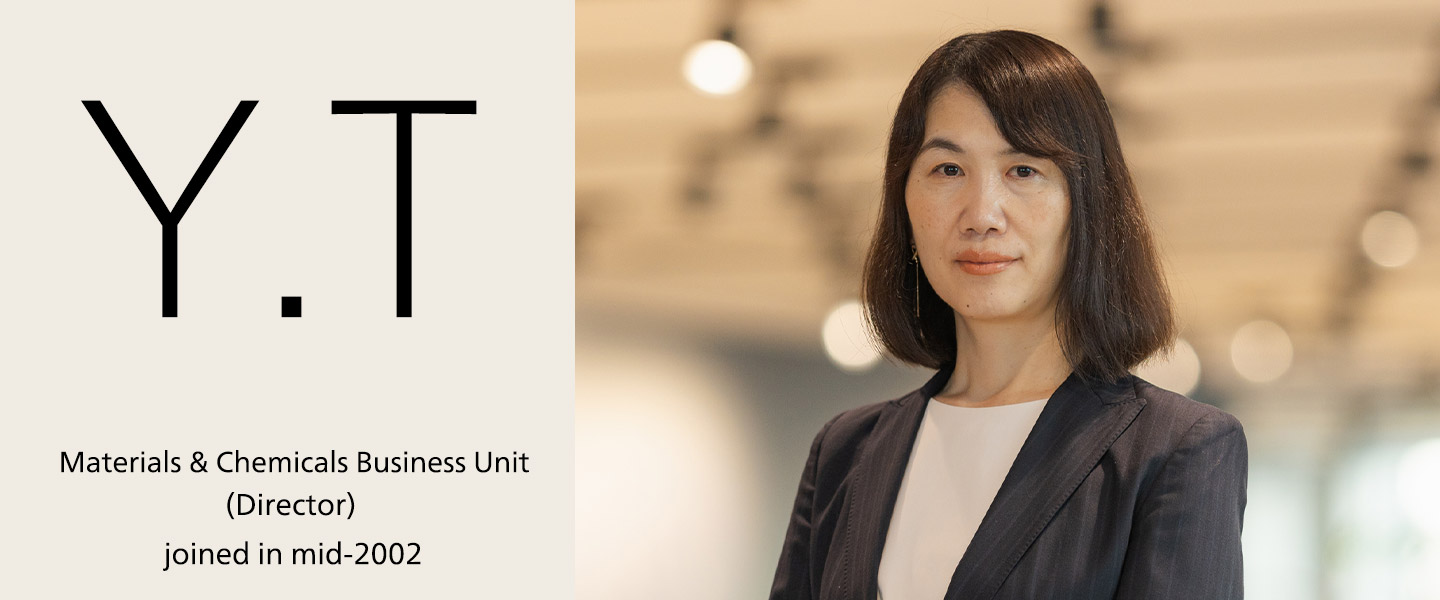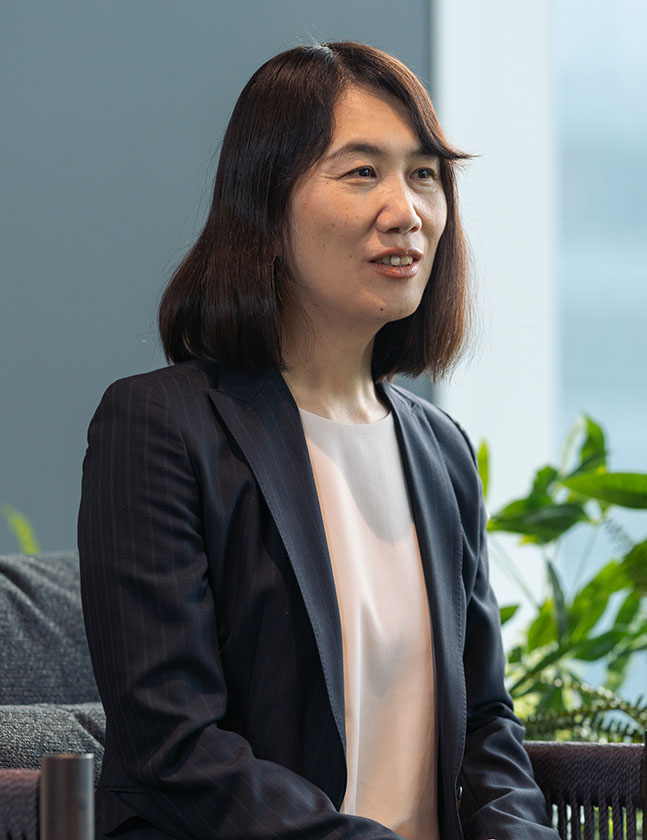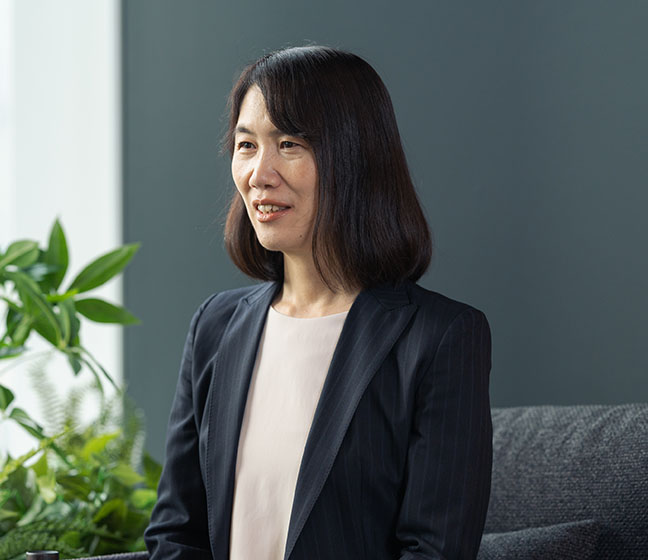Becoming an organization in which everyone can feel comfortable at work through a project for women's participation and advancement
The energy industry has been characterized by typically male-dominated workplaces. Meet a director who is questioning this conventional wisdom, using an in-house project at ABeam as her point of departure in taking on the challenge of active participation and advancement by women in the industry.
Becoming an organization in which everyone can feel comfortable at work through a project for women's participation and advancement

Experiences in ABeam ~ Impressive Project~
To change the conventional wisdom that there are few women in this field ...

Since joining ABeam, I have consistently supported clients in the energy industry. I have been to visit important infrastructure facilities such as power plants, refineries, and other large-scale plants, and participated in a diverse range of projects, including conceptualization, system implementation, operation, and establishment of operation and maintenance. While I have found this to be a very rewarding mission, there was a moment at which I became aware of a problem.
It is that there are so few women in the energy industry, both on the client and consultant side. This could be a structural inevitability, given that the industry is dominated by people with engineering and mechanical backgrounds.
In fact, ABeam is no exception, and the Materials & Chemicals Business Unit, to which I belong, has one of the lowest percentages of women in the company. But given that today's world demands decision-making by diverse organizations, can we continue to grow with the same organizational structure as before? My sense was that this is a problem that ABeam will have to overcome, as will our clients.
The first project I began working on was for women's participation and advancement in the Materials & Chemicals Business Unit. We accept people regardless of age or gender, and discuss issues caused by life events and career stages, and consider solutions.
As a counselor myself, am now also responsible for providing career advice to our female members. ABeam has a Counselor System in which a supervisor or senior employee acts as a counselor for each consultant. Through the system, we have continued to work together with consultants to develop their career visions through one-on-one conversations. Based on these conversations, we also work with the Assignment Review Team in the Materials & Chemicals Business Unit to ensure flexible assignments.
In this one-on-one setting, we might hear concerns about a promotion, for example. More than a few people who are soon to be promoted to manager may feel hesitant if they are also about to take maternity leave, wondering if they will be able to balance raising children at home with being a manager at work.
Meanwhile, there is a growing number of role models for members with such concerns. This is because the environment has become more conducive to remote work, and more employees are engaged in child rearing while working from home. I have heard from many of them that they are now able to devote time to raising their children that they used to spend traveling and commuting to work. Men are also increasingly making an active commitment to childrearing—not just women.
Amid these changes, there is much more frequent communication with the company, regardless of gender, such as requests by a parent to start a meeting at 10:00 a.m. because they have to take their child to daycare. I have become convinced that efforts to promote women's participation and advancement are never just for women, since a work environment that is accommodating to women should naturally be accommodating to men as well.
In the future, there will be an increasing need to devote time not only to raising children but also to nursing care for family members. Creating a work environment that is flexible for everyone means having a system in place to accommodate these situations.
Why ABeam ?
Moving into the consulting industry in search of larger-scale projects
I started my career working for a large system integrator. Since I majored in mathematics at university and used information systems in my research, I chose to work in the IT industry upon graduating. The mission I was assigned was that of interviewing companies in various industries and business sectors about their business transformation needs, and supporting them in implementing management infrastructure systems.
Since many of the clients were small and medium-sized companies, I was in charge of the project in an integrated manner, from upstream to downstream. I had to handle multiple projects at the same time, which kept me busy every day, but for that I was all the more blessed with opportunities for growth. The experiences I had at that time have formed a cornerstone for my work.
And yet, even in those heady days, I still felt somehow unfulfilled. I wanted to be involved in larger projects and take on challenges in a wider world. This desire led to an interest in the consulting industry.
So I began a job search and was selected by several consulting firms. During this process, I came across ABeam, and was immediately attracted by the personality of the interviewer, who expressed interest in my story despite my inexperience in the industry, and thought together with me on ways of developing a career expansion pathway based on my experience with the system integrator. I got the intuitive sense that this was a place where I could do interesting work.
And the scale of the projects that ABeam handles was also attractive. I heard that from the start I would be able to get involved in projects with large companies, so I figured that this would meet my goal in changing jobs.
In fact, the first project I joined after being hired had more than 100 people working on it, including the client. I was surprised at the sheer number of people involved. ABeam was not as large then as it is today, and I was excited about the possibility of being a part of the company's growth, as well as my own.
Future ~Growth Story~
Active participation and advancement by women is also a way to strengthen competitiveness

Female members of ABeam's Materials & Chemicals Business Unit are gradually increasing. I am now looking to take the knowledge I have gained through our in-house project for women's participation and advancement and apply it to supporting the same progress for women at our client companies.
Something I have come to realize through my various efforts is that in order to create a workplace where women actively participate, we have to change the internal facts on the ground.
When things don't go well with women's participation and advancement, it is often due to underlying deep-seated problems within the organization. It may be that seniority-based organizational management persists, or that the organization is overly verticalized with attenuated horizontal communication. The "few women" phenomenon may just be the evident part of the problem, the visible tip of the iceberg that constitutes these underlying problems.
It is also crucial that we increase the number of women who can offer their opinions from the management side and serve as role models for female members. This is because more than a few women have concerns about what their career path will be like if they can't find a role model.
Most Japanese companies continue to have low ratios of women in both management and general office work positions. Moving forward, I intend to keep taking action to help as many companies as possible actively elevate women and support their career development.
Of course, there's no advantage to a business operation or to an organization in forcing things just to get the numbers up. If we can establish a system in which women can genuinely engage in active participation and advancement, based on the essential premise of appropriate skill development as well as organizational and peer support, then we will be able to make the energy industry in Japan even more highly competitive.


